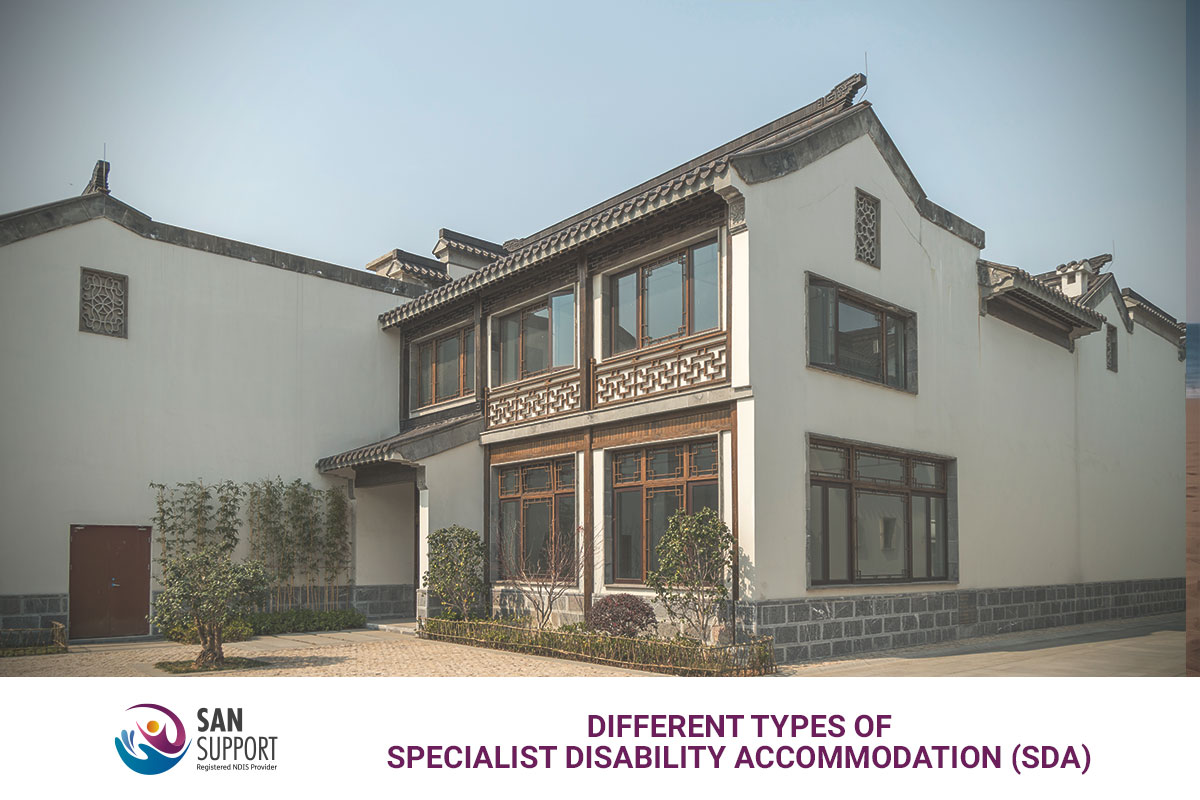
The National Disability Insurance Scheme (NDIS) funds Specialist Disability Accommodation (SDA) for participants with extreme functional impairment or very high support needs. SDA homes are not standard rentals – they are purpose-built or modified properties that make living safer, more accessible and more independent for people with significant disabilities. Understanding the different types of SDA helps participants and families choose housing that best supports their individual needs and goals..
In this guide, we explain:
- What Specialist Disability Accommodation is
- Who qualifies for SDA funding
- The four SDA design categories (Improved Liveability, Fully Accessible, Robust and High Physical Support)
- How SDA funding works
- How to choose the right SDA home
What is Specialist Disability Accommodation (SDA)?
Specialist Disability Accommodation is housing that includes specialised design features to meet disability-related needs. These homes help participants live independently while ensuring support workers can provide safe, effective care.
SDA housing may include:
- Step-free access and wide doorways
- Ceiling hoists or other assistive technology
- Impact-resistant walls and secure fittings
- Smart home features such as automated lighting and doors
It is important to understand that SDA funding does not cover support workers, personal care or daily living expenses like food or electricity. Instead, it funds the design and specialist features of the home itself.
Who is Eligible for SDA?
Not every NDIS participant can access SDA funding. The NDIA approves SDA only for participants who:
- Have extreme functional impairment (need help with most daily activities) or
- Require very high support needs that standard housing cannot meet.
The NDIA bases decisions on professional assessments and evidence from doctors, occupational therapists and other allied health professionals.
The Four SDA Design Categories
The NDIS recognises four SDA categories. Each type supports different needs and goals.
Improved Liveability SDA
Who it helps: Participants with sensory, intellectual or cognitive impairments.
Features:
- Wide doorways and hallways
- Clear signage and simple layouts
- Enhanced lighting and visual contrast
- Sensory-friendly environments
Example: A person with low vision benefits from clear floor plans, improved lighting and contrasting colours that make navigation easier.
Fully Accessible SDA
Who it helps: Participants with significant physical disabilities who use wheelchairs or mobility aids.
Features:
- Step-free access throughout the home
- Wide hallways and doorways
- Accessible bathrooms and kitchens
- Adjustable bench tops and appliances
Example: A wheelchair user can independently cook meals or access the bathroom without barriers.
Robust SDA
Who it helps: Participants with behaviours of concern who need a safe, durable environment.
Features:
- Impact-resistant walls, doors and fittings
- Secure windows and doors
- Low-maintenance finishes
- Additional staff areas for safe support
Example: A participant with behavioural outbursts benefits from robust design, which reduces the risk of injury and property damage.
High Physical Support SDA
Who it helps: Participants requiring complex physical assistance, medical equipment or assistive technology.
Features:
- Structural provisions for ceiling hoists
- Smart home technology and automation
- Emergency power for life-supporting equipment
- Fully accessible layouts for 24/7 care
Example: A participant using a ventilator or requiring hoist transfers relies on High Physical Support SDA to ensure safety and independence.
How Does SDA Funding Work?
When approved, SDA funding is added to the participant’s NDIS plan. It helps pay for the cost of housing, not for daily living costs or support services.
Participants may still contribute:
- A reasonable rent contribution (capped by the NDIS)
- Standard living costs like groceries, utilities and personal items
Funding depends on:
- The participant’s disability needs
- The SDA design category
- The type of dwelling (apartment, villa, townhouse, group home)
- Location and available SDA providers
How to Choose the Right SDA Home
Choosing an SDA home requires careful planning. Participants should:
- Assess both current and future needs
- Decide whether they want to live alone or with others
- Consider the location in relation to family, friends and community
- Work with a support coordinator and allied health professionals to identify the most suitable option
Frequently Asked Questions (FAQ)
SDA is a type of housing designed for NDIS participants with very high support needs or extreme functional impairment. It includes accessible features that make independent living safer and easier.
Eligibility depends on whether the participant has extreme functional impairment or very high support needs that cannot be met in regular housing.
No. SDA funding only covers the cost of the home and its specialist features. Daily supports, such as personal care, are funded separately in the NDIS plan.
Yes. SDA includes options like apartments, villas and group homes. The choice depends on the participant’s needs, goals and funding approval.
The four categories are Improved Liveability, Fully Accessible, Robust and High Physical Support.
Final Thoughts
Specialist Disability Accommodation (SDA) is more than housing it is a foundation for independence, safety and dignity. Each SDA design category is tailored to meet different participant needs, from Improved Liveability for sensory impairments to High Physical Support for complex care. At SAN Support, we believe the right home makes all the difference. By understanding the types of SDA and working with the NDIA, participants and their families can make informed housing decisions that support long-term wellbeing and independence.
SAN Support is a registered NDIS provider in Brisbane and we also Provide SDA service. You can check out our properties here: https://www.sansupport.com.au/sda/
You Can Also Read:
